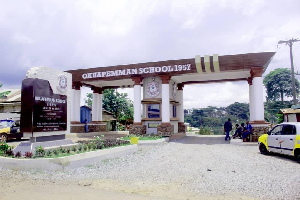- Home - News
- TWI News | TV
- Polls
- Year In Review
- News Archive
- Crime & Punishment
- Politics
- Regional
- Editorial
- Health
- Ghanaians Abroad
- Tabloid
- Africa
- Religion
- Election 2020
- Coronavirus
- News Videos | TV
- Photo Archives
- News Headlines
- Press Release
General News of Friday, 28 October 2011
Source: Charles Takyi-Boadu
GBC Boss Sued

A Tema-based businessman, Samuel Osei Boateng, has instituted a legal action against the newly-appointed Director General of the state-owned Ghana Broadcasting Corporation (GBC), Berefi Afari Appenteng, and the National Media Commission (NMC), the body that appointed him.
A week or two ago, the NMC, which is the first defendant in the case, issued a statement announcing the appointment of Mr Appenteng, who is the second defendant and a member of the commission, as the Director General of GBC, pursuant to the Constitutional mandate of the Commission.
Mr Boateng, through his lawyers, Nkrabeah and Associates, has taken the issue to the Supreme Court, seeking a declaration that on the true and proper interpretation of Articles 168, 23 and 296 of the Constitution of the Republic, the NMC cannot appoint one of its members to the position of Director General of the GBC without affording other Ghanaians the opportunity to apply for the position.
His argument is that the appointment of Mr Appenteng by the NMC, without offering other qualified Ghanaians the opportunity to apply for the job by way of advertisement, contravenes the spirit and letter of Articles 23 and 296 of the country’s Constitution.
He premised his decision to sue on Article 23 of the Constitution which states, “Administrative bodies and administrative officials shall act fairly and reasonably and comply with the requirement imposed on them by law and persons aggrieved by the exercise of such acts and decisions shall have the right to seek redress before a court or other tribunal.”
Mr Boateng further quoted Article 296 of the Constitution which also states, “When in this Constitution or in any law other law, discretionary power is vested in any person or authority”… (a) “That discretionary power shall be deemed to imply a duty to be fair and candid”… (b) The exercise of the discretionary power shall not be arbitrary, capricious or biased either by resentment, prejudiced or personal dislike and shall be in accordance with due process of law.”
His argument was that in exercising this power bestowed on the NMC by Article 168, the commission should do so in a more transparent and fair manner, noting that “to appoint one of their members without affording any other Ghanaian who may qualified and interested in the position the opportunity to apply is definitely not fair and candid”.
This, he considered unreasonable since “reason will dictate that to get the best person to fill the vacancy, the NMC must consider several qualified persons and appoint the best” because “it could be that had a transparent process been employed, the second defendant (Mr Appenteng) could still come up tops.”
The Tema-based businessman averred that by appointing one of their own without giving other persons the chance, the NMC had denied itself and the people of Ghana the opportunity to pick the most suitable person for the position, indicating that such acts raised serious questions in minds of the citizenry about the integrity of the commission.
Considering the watchdog role that the NMC played, Mr Boateng noted, “it cannot be allowed to act in a manner that will erode public confidence in its operations, particularly when such act conflicts with the letter and the spirit of Articles 23 and 296 of the 1992 Constitution.”










